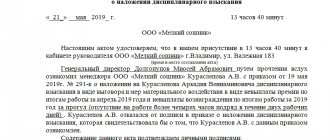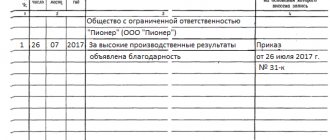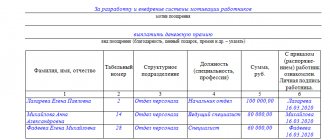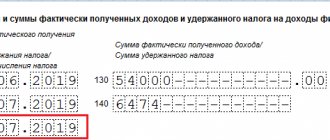Article 191 of the Labor Code of the Russian Federation explains in detail the rights of the employer with a legal basis for independent decision-making: which employees and when to remunerate financially. There are several types of methods and various incentives, and by law, the management of enterprises determines the amount of bonuses and in what order they should be issued (if there is no information in the employment contract).
Only legal obligations can regulate the actions of superiors in reducing or refusing remuneration. If they are not there, the manager can, without explanation, vary the bonuses, terms and conditions of their issuance.
The following method is often used as an incentive tool - an order is created to reward staff to increase labor efficiency and discipline.
Types of bonuses
A competent manager always knows about the abilities of his employees, their achievement of effectiveness in production processes, and their initiative in solving problems.
This category of employees is distinguished by awarding bonuses. Documented gratitude emanating from the director of the company is divided by volume:
- mass - when an award is issued with recognition of merit in material or moral form for an entire department or group of employees;
- single - in this case, you need to highlight the achievements of one employee.
Methods of stimulating employees may differ in the regularity of registration.
Created in the form:
- planned - combined and executed together with local documents for a quarterly or annual bonus;
- unscheduled - formed in a separate case, when the boss decides to reward his subordinate financially for a certain merit.
There must also be a justified reason, on its basis the head of the company comes to the conclusion that it is necessary to raise the mood of his staff, then the following is formed:
- production - productivity has increased, new technologies have been introduced;
- organizational – there was a need to highlight distinguished activists;
- festive - in this way the employer congratulates workers on a significant date or the onset of a holiday.
Any production incident, regardless of the type of bonus, is supported by an internal order coming directly from the manager.
In what cases can bonuses be deprived?
An internal document of the enterprise should establish not only the procedure for calculating bonus payments to employees, but also the conditions under which an employee may be deprived of a bonus.
Within the framework of current legislation, the following may apply:
- Deprivation of bonuses is one of the types of financial punishment of employees. It is carried out in the form of deprivation of bonuses or reductions in the amount of bonus payments on an irregular basis.
- Deprivation of the right to receive bonus accruals - applies if the enterprise is in a difficult economic situation.
- Issuing a reduced bonus is applicable as a disciplinary punishment for violating the company’s internal code.
Important . Bonus payments are made only from the company's net profit. If no profit was recorded during the last reporting period, the employer can legally deprive all employees of bonuses.
Need for encouragement
It is not a mandatory action to specifically develop orders that stimulate production productivity and select the appropriate form of document for this. But the benefits of bonuses have been identified for both enterprises and workers.
With the help of the order, financial order is carried out, it regulates material costs, which affects the reduction of taxes.
Work at enterprises is accompanied by the emergence of various situations that are controlled by the norms of the Labor Code of the Russian Federation. These regulations recommend both punishment and gratitude, they regulate the normal course of work processes, ensure safe work and bring the company to its goals.
The selection of an employee from the total number should be carried out publicly, solemnly and in front of the team. By his behavior, the employer psychologically influences the workers, which will have a beneficial effect on future management.
Scientists conducting research in this area have found that conscientious workers, who are in an equal position with violators of production discipline, who do not strive to increase work performance, gradually reduce motivation and work without interest.
The favorable attitude of superiors towards their subordinates is of great importance. Of course, a commercial enterprise has more financial opportunities than budget organizations, but sometimes attention itself is important. In any case, the awarding must take place in an orderly manner.
How are awards assigned?
A bonus is an incentive tool that is used in relation to employees for the sake of showing initiative on their part in the workplace, striving for higher indicators of the quantity and quality of work done.
How bonuses are calculated for an individual employee and the entire team, taking into account his salary and the specifics of work, should be specified in the company’s local regulations.
In order to correctly assign the size and type of bonus, the employer must be guided by the following factors:
- Equal treatment of all team members, fair calculations in relation to each employee;
- The awarded bonus is justified by a clear wording and is given for certain achievements in work;
- The bonus is paid in proportion to the salary of each individual employee;
- Bonus payments are awarded only to outstanding employees who have distinguished themselves by high productivity and ability to work both independently and in a team;
- The award is awarded not only for the volume and quality of work done, but also for the development of a new concept for production optimization, which simplifies the performance of work tasks. And also for a creative approach to current job responsibilities, which brings a positive result.
- The bonus is given to those employees who are willing to take initiative and perform tasks that exceed their current skill level. And also to everyone interested in material stimulation of work activity.
Important . For most businesses, bonuses are a desirable tool for motivating employees, but not mandatory.
If the company has special provisions that establish a clear amount of regular bonus payments for the entire team, the employer cannot ignore bonus payments to employees.
That is, if payment of bonuses at your enterprise is mandatory, but they are not awarded to you, you can contact the competent authorities with a complaint.
When is it published?
The head of the organization can analyze the result of work efficiency after reporting is generated. Such documents are created within a certain period of time, developed in regulations.
Reports are:
- menstruation;
- quarterly;
- per annum.
The discovery of significant profitability of the company is the first impetus for identifying particularly distinguished workers and employees. On this basis, an order is issued using one of the forms of incentives (stimulating or social). Internal local acts provide a legal form for the application of remuneration; they provide for and develop a procedure for action.
They contain the following algorithm:
- lists for bonuses for their subordinates are created by employees of a higher position in the department;
- compliance with incentive rules is checked;
- the list of worthy employees submitted for consideration is corrected, and the presence of violations of discipline is determined;
- the issues of each individual case are agreed upon between the management of the structural unit and the director of the company, the material amount of payments is determined;
- The final version of the document is retained and approved by the head of the company.
Applicants are introduced to the order at a general meeting of the organization or in the department in front of their colleagues. Management has the right to decide independently how best to reward the representative.
What is better to use - T-11 (T-11a) or your own form
The tool for rewarding subordinates is a created order from their leader.
The legislation allows you to draw up a document without restrictions, using any acceptable free form filling. The forms long used by institutions have not lost their relevance. These include samples:
- for bonuses for one employee - T-11;
- awarding a group of employees - T-11a.
The demand for previously created copies is explained by the convenient arrangement of information in them regarding:
- employers;
- awarded;
- the reasons that prompted the authorities to issue the award order;
- subject of encouragement.
The order is completed in writing; you can choose any filling method (printed or manual), but with the original signature of the manager and the employees to whom it concerns.
The use of long-developed forms or the creation of their own separate service for the remuneration procedure for workers, the services responsible for these actions, decide independently at each enterprise, of any direction.
Rules for filling out and contents of the order
Based on the order, actions are carried out with bonuses for employees; it is compiled in the amount of one copy. It is subject to mandatory registration in a special journal, then transferred to the financial department, then transferred along with the rest of the documentation for storage in the archive.
An order with a standard form is filled out simply and clearly, responding to the requirements of the column. The distinguishing feature between T-11 and T-11a is the director’s order to encourage one or a group of employees.
So, in the first part of T-11 the name of the company and its details are indicated. Next, the details of the awarded citizen are indicated with his information about his place of work and position.
They indicate why the management decided to reward the employee and in what form (valuable gift, amount of money). The basis may be a petition from the head of the department.
The group bonus document contains differences in the column where the name of the individual recipient was indicated. Fill in the motivation and type of award. The second part begins with a table - it contains a list of award recipients with their data indicated and a separate line in which employees must put their signatures.
Documents for download (free)
- Sample order for bonuses for employees
- Form T-11
- Form T-11a
Memo on payment of bonuses
If we are talking about the payment of a one-time bonus, it can be documented in a memo. For other types of bonuses, it is necessary to draw up an order according to the sample indicated above or issue it on the basis of internal documents of the company.
There is currently no clear template according to which a memo is drawn up. It can be compiled in any form, but must include the following data:
- Name, surname and patronymic of the employee being awarded, his position;
- Evidence of the grounds for issuing bonus payments to the employee;
- A clear formulation of the incentive motive.
If errors are made in the memo, they may serve as a reason for special attention when checking the normal functioning of the enterprise.
Benefits of Documenting Information
The normal functioning and development of an enterprise is carried out through the possession of information in a certain field of activity.
The information is:
- intelligence;
- indicators;
- data describing the production process.
Institutional orders are part of the information data; they can be oral or documented. This means that the procedure was recorded using a material medium, details were applied that allow the paper to be identified.
If the document is created properly and certified by a signature, it becomes official. The bonus order used in the current activities of the organization belongs to the official one.
It is accompanied by a number of significant functions:
- informational, as a carrier and source;
- managerial, allows you to improve the production process;
- accounting, it helps to save information;
- social, reflects the public sphere of activity;
- legal, confirms the fact of the activities being carried out within the legal framework.
Documenting orders serves as confirmation not only of the completion of a particular activity.
https://youtu.be/KyGR3IbtjgA










